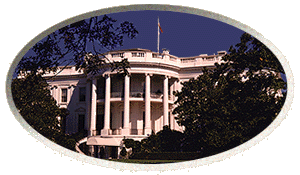Political Science 3011-300
Ketchum 120

The American Presidency
MW 6.00-8.30
| Dr.
Vincent McGuire
Political Science 3011-300 Ketchum 120 |
 |
University
of Colorado
The American Presidency MW 6.00-8.30 |
|
|
Required Readings: Students are required to purchase four books for this course. These books are available in the UMC bookstore and the Colorado Bookstore on the Hill:
Theodore J. Lowi, The Personal Presidency: Power Invested, Promise Unfulfilled Cornell University Press 1985, ISBN 0-8014-9426-5 This study analyzes the modern presidency and finds that while the American people’s expectations of presidential success have increased drastically, the ability of any president to fulfill those expectations has diminished.
Stephen Skowronek, The Politics Presidents Make: Leadership from John Adams to Bill Clinton Harvard University Press, ISBN 0-674-68937-2 Skowronek posits the theory that the politics of any given presidency are determined by the presidents’ place in the ‘regime cycle.’ The cycle is begun by a regime originator, an articulator of the public philosophy, and the regime deteriorates as a function of normal politics. Places the chronology of the presidency within a theoretical framework.
Stephen Mayer, With a Stroke of the Pen: Executive Orders and Presidential Power Princeton University Press, ISBN0-691-01204-0 Mayer offers an alternate view to the weak presidency thesis. The use of executive orders, outside the separation of powers scheme, has become a major managerial tool of modern presidents.
Michael Nelson, The Presidency and the Political System, 7th ed., Washington, D.C. CQ Press 1998, ISBN 1-56802-496-7 A ‘reader’ with contributions from experts in various fields including: approaches to studying the presidency, presidential power, the presidency and Congress, the bureaucracy and government.
Recommended, not required
Gary L. Gregg II The Presidential Republic, Executive Representation and Deliberative Democracy, Rowman & Littlefield Publishers, Lanham, Boulder, New York, London, 1997. ISBN 0-8476-8378-8
Richard Neustadt, Presidential Power and the Modern Presidents: The Politics of Leadership from Roosevelt to Reagan revised edition, New York: Free Press, 1990. ISBN 0-02-922796-8 Neustadt’s look at the American President focuses not on the office, but on the individual as one among many in a set of institutions. Employing a series of case studies, he shows how presidents actually use the resources of their office to exercise power.
Tara Ross, (2004) Enlightened Democracy: The Case for the Electoral College, World Ahead Publishing ISBN: 0974670154
Gary L. Gregg II, Ed., Securing Democracy: Why We Have an Electoral College Intercollegiate Studies Institute ISBN: 1-882926-65-x A series of readings from a variety of experts on why the Electoral college is not outdated but a brilliant concept and crucial to the workings of the constitutional system but necessary in securing representative democracy.
James Taranto and Leonard Leo, Eds., Presidential Leadership: Rating the Best and the Worst in the White House, Free Press; 2004, ISBN: 0743254333
Martin Fausold & Alan Shank, Eds., The Constitution and the American Presidency State University of New York Press, 1991 ISBN 0-7914-0468-4. Fausold & Shank show the development of both the presidency an the constitution via the way in which various presidents have viewed and altered the document.
Richard J. Ellis, Ed., Founding the American Presidency, Rowman & Littlefield Publishers, Lanham, Boulder, New York, London, 1999 ISBN 0-8476-9499-2
![]() The Web:
I have set up various hyperlink to web sites which will greatly enhance your
understanding of American government and the presidency. My web page is listed
above. Log on and go to your syllabus. From there you can navigate to numerous
sites which relate to the topics we are discussing. In addition, there are links
to more esoteric topics.
The Web:
I have set up various hyperlink to web sites which will greatly enhance your
understanding of American government and the presidency. My web page is listed
above. Log on and go to your syllabus. From there you can navigate to numerous
sites which relate to the topics we are discussing. In addition, there are links
to more esoteric topics.
Also of importance is subscribing to the class E-mail roster. This allows me to
contact you quickly and easily as well as helping you communicate with the
entire class for assistance with, e.g. notes, discussions, exam study groups.
For more
info visit: http://www.colorado.edu/ITS/emaillists/faq.html
![]() Policies: All University policies are in effect for this course. The
University Honor Code (http://www.colorado.edu/academics/honorcode/Home.html) is
the most important policy in this class. It is taken, by me, with the utmost
seriousness. Familiarize yourself with these policies especially in regards to
incompletes, drops/add, withdrawal, etc. Students are expected to attend all
classes, do all reading prior to the class and take all exams at the appointed
times. No make-up exams will be given. No ‘extra credit’ is ever given.
Policies: All University policies are in effect for this course. The
University Honor Code (http://www.colorado.edu/academics/honorcode/Home.html) is
the most important policy in this class. It is taken, by me, with the utmost
seriousness. Familiarize yourself with these policies especially in regards to
incompletes, drops/add, withdrawal, etc. Students are expected to attend all
classes, do all reading prior to the class and take all exams at the appointed
times. No make-up exams will be given. No ‘extra credit’ is ever given.
If you have specific physical, psychiatric, or learning disabilities and require
accommodations, please let me know early in the semester so that your learning
needs may be appropriately met. You will need to provide documentation of your
disability to the Disability Services Office in Willard 322 (phone
303-492-8671).
If you have any problems with the college, the course, the material or me,
please come see me. If there is anything I can help you with please come see me.
I am here to help.
Page last updated: 05/31/05
visitors since August 27, 1999